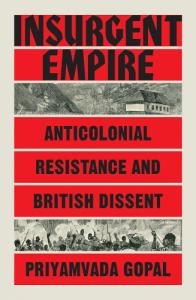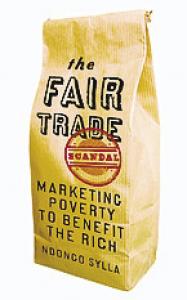On 12 November, a giant 70 square metred (23-foot by 33-foot) Africans Rising banner was hung on scaffolding on the side of the houses of parliament in central London. The huge letter, launching the #ReRightHistory campaign of Africans Rising for Justice, Peace and Dignity, made four demands. It called on the government of the UK to:
apologise for the human cost of slavery and colonialism begin a Truth and Reconciliation process in relation to the UK’s colonial crimes cancel African…Global justice
In this book, Cambridge university academic Priyamvada Gopal confronts the now infamous 2014 YouGov poll which found 59 percent of Britons thought the British empire was ‘something to be proud of’.
Resistance to empire was frequent, she notes, with connections formed between critics of imperialism based in the UK and rebels in the colonies.
Furthermore, Gopal argues that a form of ‘reverse tutelage’ took place, as insurgents and the movements they led helped to shape…
Does Fairtrade work? In May, a four-year study by academics at London University reported that, for wage workers in Fairtrade and non-Fairtrade producer organisations in Ethiopia and Uganda, Fairtrade status made no difference to poverty levels. The researchers also found evidence that the benefits of the Fairtrade premium, distributed to producer communities, were not fairly shared.
The Fairtrade Foundation responded that the results were not representative of the success of…
The World Bank and International Monetary Fund (IMF) are often associated with a bunch of grey-clad number crunchers in Washington DC. Too boring, too technical, too obscure. Its true that their jargon and formula-cluttered reports can easily put off or intimidate anyone.
Perhaps best known for its role in the debt crisis and being a target of protesters in Prague, the World Bank is now expanding its role to a global knowledge bank.
Producing research and setting standards on…
PN In the book you don’t embrace or push any single ideology. Why?
NK For this book, I did not want to be arguing for a particular ideology except democracy. This book is really about democracy, about how democracy has systematically been sabotaged through the harnessing of shocks and crises to bypass democracy.
So the extent to which I’m drumming away at any ideology, it really is deep democracy, participatory democracy.
The closest I ever came to focussing squarely on…
How and when did the INDG come into being?
The International Network on Disarmament and Globalisation formed at the Hague Appeal for Peace conference in May 1999. It arose out of a panel discussion on the Militarisation of the Global Economy, which was standing-room only.
Following the forum, a small meeting was held to continue the discussion and better educate the peace movement about the effects of globalisation on our peace work. (My speech at that Hague…
With contributions from fourteen campaigners and corporate practitioners, The Fair Trade Revolution is the Fairtrade Foundation’s official, if somewhat dry, history of the movement. It grew out of the grassroots activism of the 1960s, and editor John Bowles contends a “fundamental paradigm shift” has occurred in the last decade, with sales of Fairtrade goods in the UK topping £1 billion last year.
With fair trade guaranteeing producers in the developing world a minimum price for…
The basic argument of this book, originally written 18 months before 9/11, was that the “traditional” method of political control through the projection of military power, which Rogers dubbed “the control paradigm” would not work in an increasingly fragile and unpredictable world. He argued that a model of security based on a military security would simply fail as it did not address the growing socio-economic divide nor the rising environmental crisis, but merely attempted to keep a lid on…
The poetics of the Zapatistas should have been a perfect read. I’ve been fascinated by the Zapatista movement, ever since they stormed into San Cristobel in January 1994, and my sister Lucy (who lived in Mexico at the time) has often enthused of the literary quality of Subcomandante Marcos’s writing. So why was this book such a let down in parts?
Part of the problem was, I think, the author isn’t quite sure who his audience is. The title and front cover (a masked Zapatista doll…
“Think global; act local” is a very good principle but it is scary when you have no choice but to do so. Here in East London we are being forced to think globally. Some Peace News readers know the ExCeL Exhibition Centre in Custom House because it is the venue for the DSEi arms fair, which boasts that it is the biggest in the world. East London Against the Arms Fair has frequent protests at ExCeL, calling for cancellation of this and all arms fairs.
Any arms fair arguably…
On 10 November, a noise demo was held outside a ceremonial dinner in the City of London being addressed by prime minister Gordon Brown.
War on Want, World Development Movement, Trade Justice Movement, Stamp Out Poverty, New Economics Foundation, CAFOD, Action Aid and Jubilee Debt Campaign came together to draw attention to global poverty and the role of the City.
The Jubilee Debt Campaign is calling for “a radically different economic system which reduces inequality, creates…
The Welsh International Sector Network, which works for peace, justice and global citizenship, funded 8 people to attend the anti-G8 demonstrations in Germany. WISeN Coordinator James Maiden ponders his experience:
“Some of the people we funded helped Oxfam International pull off a successful media stunt. This involved the now famous `Big Heads' - fantastic caricatures of the G8. At a specially constructed card table the Big Heads played with a campaigner from Ghana. “The message was…
No doubt, this World Social Forum is different. Africa - Kenya & - makes its presence felt. Kenyan and African culture and music are present everywhere at the forum, to the extent that the drums and music do not always have a positive impact on discussions.
But Africa also makes its presence felt in terms of participation and content: on the one hand negatively , as participation from European and Latin American social movements is poor , compared to previous World Social Forums…
The big shopping splurge of the year is upon us. Are we buying war and injustice for gifts and ourselves? It is time to consider the implications of our shopping habits. Around the world people are speaking though their wallets: boycotts and ethical buying are powerful tools.
First of all, we can support international boycotts of corporations embedded in war and oppression. The global boycott of corporations that support the war in Iraq was launched in 2004 at the World Social Forum…
When this documentary premiered in Caracas last year, the Venezuelan Ministry of Culture cancelled its second screening at the National Cinema unless the producers removed the ministry's name as funder of the film. Why were they so upset?
The film exposes the contradiction of building socialism through oil wealth. The state oil company PdVSA is revealed as a corrupt, bureaucratic monster destroying communities and the environment in its relentless search for hydrocarbons.
Sure…



